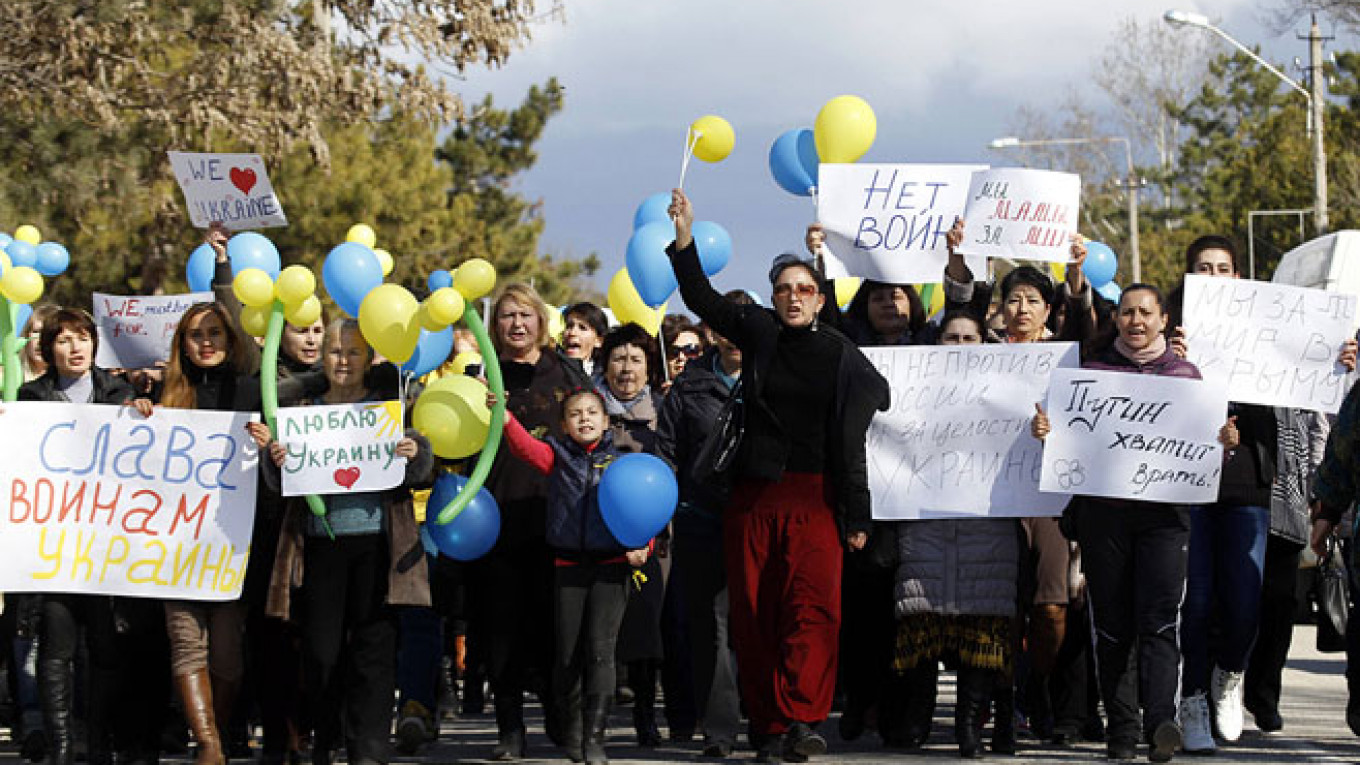Russia said Wednesday it could not order "self-defense" forces in Ukraine's Crimea region back to their bases ahead of crucial ministerial talks in Paris aimed at easing tensions of over Ukraine and averting the risk of war.
Speaking before meeting U.S. Secretary of State John Kerry and other Western ministers in Paris, Russian Foreign Minister Sergei Lavrov repeated Moscow's assertion — ridiculed by the West — that the troops that have seized control of the Black Sea peninsula in Ukraine are not under Russian command.
Asked whether Moscow would order forces in Crimea back to their bases, Lavrov told a questioner in Madrid: "If you mean the self-defense units created by the inhabitants of Crimea, we give them no orders, they take no orders from us.''
"As for the military personnel of the Black Sea Fleet, they are in their deployment sites. Yes, additional vigilance measures were taken to safeguard the sites … We will do everything not to allow any bloodshed."
Russia did not attend a meeting with Kerry, British Foreign Secretary William Hague and Ukrainian Foreign Minister Andriy Deshchytsia of the so-called Budapest Group created to assure Ukraine's security after it abandoned nuclear weapons in 1994.
But Kerry and Hague said they would try to bring the Russian and Ukrainian ministers together later in the day.
Poland's foreign minister tweeted that he would attend a meeting in Paris with those two ministers plus the U.S., Germany, Britain, France and the Organization for Security and Cooperation in Europe, or OSCE.
There was no immediate confirmation that all sides would attend the French-brokered session, which could be the first step toward a diplomatic mediation process.
Sanctions
Lavrov was later due to hold the first face-to-face talks with his U.S. counterpart since the crisis escalated, on the sidelines of a conference on Lebanon attended by the five permanent members of the United Nations Security Council.
NATO and Russia planned parallel talks in Brussels amid concerns that a standoff between Russian and Ukrainian forces in Crimea could still spark violence, or that Moscow could also intervene in Russian-speaking eastern Ukraine.
The West is pushing for Russia to return troops to barracks, accept international monitors in Crimea and Ukraine and negotiate a solution to the crisis through a "contact group" probably under the auspices of a pan-European security body.
France said European Union leaders meeting in Brussels on Thursday could decide on sanctions against Russia if there is no "de-escalation" by then. Other EU countries, including Germany, are more reticent about sanctions.
President Vladimir Putin on Tuesday defended Russia's actions in Crimea, which used to be Russian territory, and said he would use force only as a last resort.
This eased market fears of a war over the former Soviet republic after sharp falls on Monday, although Russian shares and the ruble slipped again on Wednesday and Ukraine's hryvna dropped against the dollar.
Russian forces remain in control of Crimea, where Interfax reported they seized control of two Ukrainian missile defense sites overnight, and Putin gave no sign of backing down.
"What he wants above all is a new empire, like the U.S.S.R. but called Russia," former Ukrainian President Viktor Yushchenko told France's Europe 1 radio.
U.S. President Barack Obama acknowledged that Russia had legitimate interests in Ukraine but said that did not give Putin the right to intervene militarily.
"President Putin seems to have a different set of lawyers making a different set of interpretations," Obama said on Tuesday. "But I do not think that is fooling anybody."
A senior administration official said Obama spoke to German Chancellor Angela Merkel and discussed a potential resolution to the crisis. The Russian-speaking German leader has good relations with the German-speaking Putin, and Berlin is Russia's biggest economic partner.
The official said Obama, in his phone call with Putin last Saturday, had discussed what officials called an "off-ramp" to the crisis in which Russia would pull its forces in Crimea back to their bases and allow international monitors to ensure that the rights of ethnic Russians are protected.
A Message from The Moscow Times:
Dear readers,
We are facing unprecedented challenges. Russia's Prosecutor General's Office has designated The Moscow Times as an "undesirable" organization, criminalizing our work and putting our staff at risk of prosecution. This follows our earlier unjust labeling as a "foreign agent."
These actions are direct attempts to silence independent journalism in Russia. The authorities claim our work "discredits the decisions of the Russian leadership." We see things differently: we strive to provide accurate, unbiased reporting on Russia.
We, the journalists of The Moscow Times, refuse to be silenced. But to continue our work, we need your help.
Your support, no matter how small, makes a world of difference. If you can, please support us monthly starting from just $2. It's quick to set up, and every contribution makes a significant impact.
By supporting The Moscow Times, you're defending open, independent journalism in the face of repression. Thank you for standing with us.
Remind me later.






